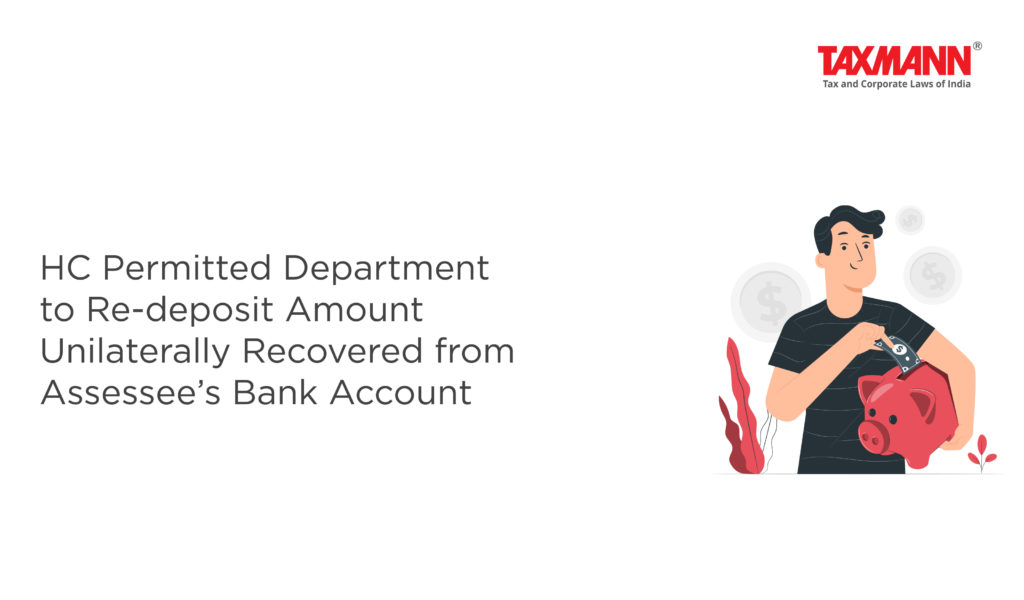HC Permitted Department to Re-deposit Amount Unilaterally Recovered from Assessee’s Bank Account
- Blog|News|GST & Customs|
- 2 Min Read
- By Taxmann
- |
- Last Updated on 12 June, 2023

Case Details: Pradeep Kumar Siddha v. Union of India - [2023] 151 taxmann.com 142 (Bombay)
Judiciary and Counsel Details
-
- Nitin Jamdar & Abhay Ahuja, JJ.
- Brijesh Pathak, Adv. for the Petitioner.
- J.B. Mishra, Dhananjay B. Deshmukh, Varun Shinde, Vivek Sawant, Adv. Rahul Kumar & Sanjay P. Mathur for the Respondent.
Facts of the Case
The petitioner filed a writ petition challenging the unilateral deduction of funds from their bank account by the GST authorities without their permission and without informing the petitioner. The court expressed concern over the authorities’ actions and considered it a gross abuse of power and a violation of the taxpayer’s rights.
The court instructed the concerned officer responsible for instructing the bank to debit the petitioner’s account to file a personal affidavit explaining the legal basis for their actions and why they did not inform the petitioner. In the affidavit-in-reply, the officer relied on Section 79(1)(c)(i) of the CGST Act to justify their actions. However, the petitioner argued that this provision was not applicable in their case.
High Court Held
Section 79 of the CGST Act deals with the recovery of tax and outlines various modes for recovery. The court observed that in this case, the respondents unilaterally deducted the amount from the petitioner’s bank account without proper legal justification. The officer responsible for the deduction was directed to file an affidavit specifying the time frame for crediting the amount to the petitioner’s account. Once the affidavit was filed within two weeks, the court registrar would allow the respondents to withdraw the amount, and it would be credited back to the petitioner’s bank account within two weeks. Given the above, the writ petition was disposed of by the court.
Disclaimer: The content/information published on the website is only for general information of the user and shall not be construed as legal advice. While the Taxmann has exercised reasonable efforts to ensure the veracity of information/content published, Taxmann shall be under no liability in any manner whatsoever for incorrect information, if any.

Taxmann Publications has a dedicated in-house Research & Editorial Team. This team consists of a team of Chartered Accountants, Company Secretaries, and Lawyers. This team works under the guidance and supervision of editor-in-chief Mr Rakesh Bhargava.
The Research and Editorial Team is responsible for developing reliable and accurate content for the readers. The team follows the six-sigma approach to achieve the benchmark of zero error in its publications and research platforms. The team ensures that the following publication guidelines are thoroughly followed while developing the content:
- The statutory material is obtained only from the authorized and reliable sources
- All the latest developments in the judicial and legislative fields are covered
- Prepare the analytical write-ups on current, controversial, and important issues to help the readers to understand the concept and its implications
- Every content published by Taxmann is complete, accurate and lucid
- All evidence-based statements are supported with proper reference to Section, Circular No., Notification No. or citations
- The golden rules of grammar, style and consistency are thoroughly followed
- Font and size that’s easy to read and remain consistent across all imprint and digital publications are applied



 CA | CS | CMA
CA | CS | CMA
